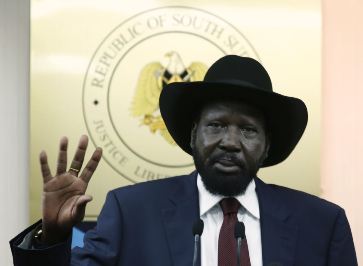Kiir explains reason not to appoint woman governor
December 30, 2015 (JUBA) – South Sudanese president, Salva Kiir, defended his decision not to appoint a single woman governor among the 28 new state governors, saying women were weak and can be kidnapped.

“The areas which brought names of women are conflict areas. But we don’t want our governor to be kidnapped and that is why we don’t bring women,” said president Kiir during the swearing in ceremony of 28 newly appointed governors on Tuesday.
Opposition politician, Peter Mayen, of the People Liberal Party (PLP) accused the president of violating the constitutional provision of 25% women representation quota when he appointed states governors at Christmas Eve on 24 December 2015.
Majongdit urged women activists and leading female politicians to speak out.
President Kiir did not mention the PLP public statement but said the concern of women governors as weak was discussed by ruling SPLM party political bureau, in which a woman, Jemma Nunu Kumba, was present as the acting secretary general.
He said the top party decision making body instead resolved to instruct the new governors to select women as their deputies in the states where women were suggested to lead.
“Please appoint women to be your deputy. But if you don’t get a woman, you can be excused for now,” he said, attracting laughers from the crowd.
The disqualification of women on the basis of their weakness is not only a stereotyping message from the head of state but also a violation of the transitional constitution which gives women an affirmative action.
Although president Kiir did not name the states in the conflict regions which selected women for the governorship positions, it was clear that some of the men who were appointed in the new states of greater Upper Nile region were not the first choices of the people, but served as a fall-back position selected by the president.
Also the president directed the new governors not to exceed seven ministers and fewer advisers in their state governments.
“Some states had 400 advisers and you wonder how they advise one person and how do you listen to them at the same time?” he inquired.
He said he will release an order instructing state governors on the number of ministers and advisers.
(ST)?
